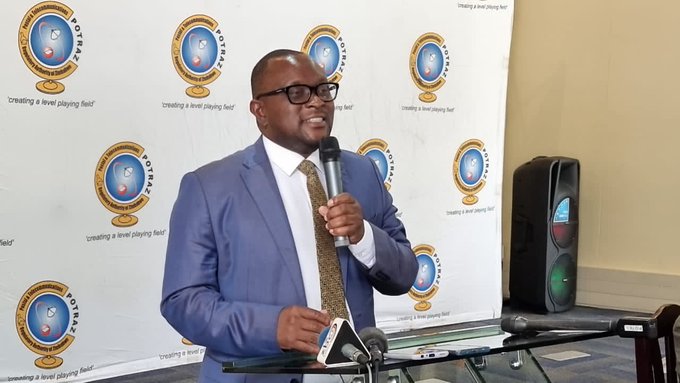|
Getting your Trinity Audio player ready...
|
Dr. Jenfan Muswere has underscored the fact that information communication technology has a positive transformational power in people’s lives.
Dr. Muswere, who is the Minister of Information Communication Technology, Postal and Courier Services, made the remarks at the official launch of Tshazi Secondary School, Stanmore Primary School, Garanyemba Secondary School, Ntepe Secondary School, Selonga Secondary School, Buvuma High School, Mkhalipe Secondary School, St Joseph Secondary School, Vhembe High School, Majini Primary School, Siyoka Secondary School and Nhwali High School ICT labs in Matabeleland South Province on 9 February 2022.
“We can now send or receive money instantly across the world at the touch of a button. We are now doing thousands of business transactions with people we have never met and are most likely to never meet. Equally true is the reality of virtual online friends whom we meet online, share content with online, and talk and laugh with all in cyberspace. Our societies are slowly but surely being remoulded by technology hence our strategic thrust to set up and make use of these digital facilities and establish a digital economy. However, we need to take cognisant of the fact that a large part of our population needs access to computers, or else the digital divide will widen and leave them economically disadvantaged. Hence the clarion call by His Excellency, President Cde E.D. Mnangagwa that no man and no place must be left behind.
“The challenges brought about by the digital divide have amplified the need for innovative ways to capacitate the marginalised areas with ICTs and promote universal access. The world has come to accept the pivotal role that ICTs and the digital economy in connecting all the people of the world virtually. It is now critical to bridging the digital divide for the 2.9 billion people who still remain offline worldwide, more so the millions not connected in our beloved nation of Zimbabwe,” Dr. Muswere said.
He said it is against this background that, Government remains resolute in the quest to attain a digital economy and knowledge society, a society where all citizens have access to ICTs, regardless of their geographical, social, or economic status. To this end, the ministry continues to provide an enabling environment for the growth of the ICTs sector, by deploying critical ICTs infrastructure like schools’ ICTs laboratories across Zimbabwe.
From a policy perspective, the Government wishes for all citizens of Zimbabwe to have access to the internet and digital connectivity, including the rural and low-income communities.
The Ministry, through its partners and technical arms, is rolling out a number of initiatives that are aimed at increasing the digital footprint in rural communities.
“I want to assure you, ladies and gentlemen, that as Government we will never tire in our unrelenting efforts to ensure that our schools are equipped with requisite ICTs equipment and that our District Government Offices have PFMS kiosks for ease of transacting Government business.”
Access to ICTs and effective participation in the digital economy is critical in improving the quality of life for all the citizens of Zimbabwe. Thus these digital economy projects and initiatives, dovetail very well with the ICT Ministry’s vision which is anchored on leveraging ICTs for sustainable development.
Dr. Muswere reiterated the role played by ICTs in the quest to achieve the SDGs by promoting inclusivity, sustainable industrialisation and fostering innovation. He said the efficient and affordable ICT infrastructure and services allow citizens to participate in the global digital economy and increase their overall economic well-being, digital inclusion, poverty reduction, and improved health care and education quality.
“Distinguished guests, ladies, and gentlemen, I cannot overemphasise the importance of digital technology in facilitating the attainment of the aspirations of the National Development Strategy One (NDS1), as enunciated by His Excellency, the President, Dr. Emmerson Dambudzo Mnangagwa. The Digital Economy is stated as one of the national priorities underpinning this strategy for the period 2021 – 2025, as we thrive to become an Upper-Middle Income society by 2030. Our Ministry will continue to play its critical role in this transformation agenda by ensuring the deployment of the ICTs infrastructure for all citizens, let alone our children. I once again would like to restate our commitment to addressing and reducing the barriers to technology and the digital divide through policies and programs aimed at ensuring the participation of all citizens in the digitalization Agenda.
“Advanced technological and digital skills are a prerequisite for the development of an innovation culture, which is the cornerstone for success in the digital economy and e-learning thrust. It is, therefore, incumbent upon us, as Government, to cultivate the e-learning culture among our children, in an effort to build relevant skills and capabilities for harnessing the digital economy for socio-economic development in Zimbabwe,” he added.






